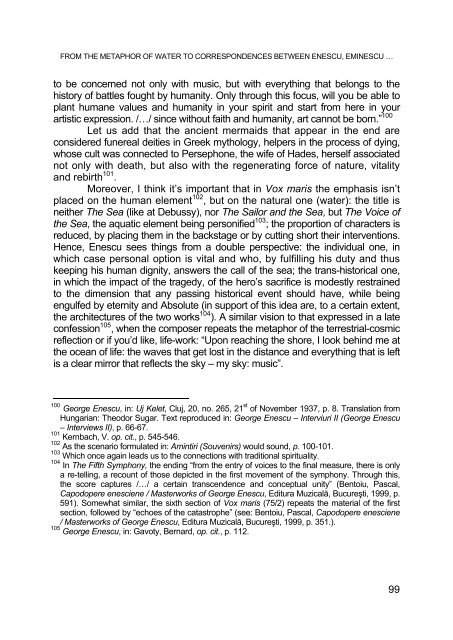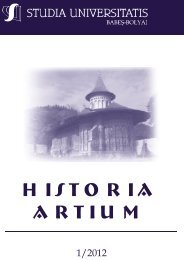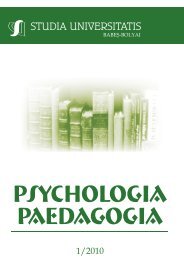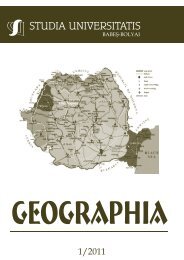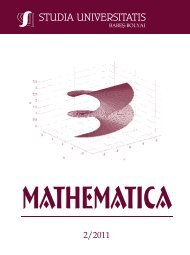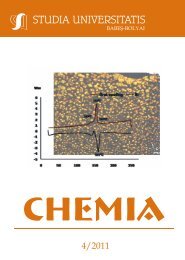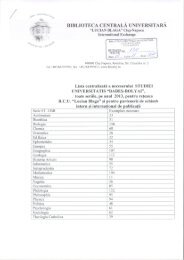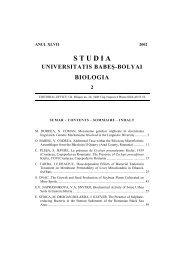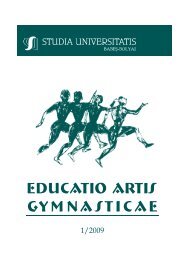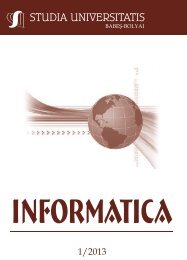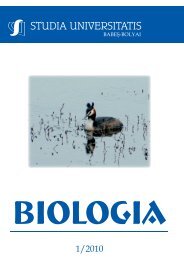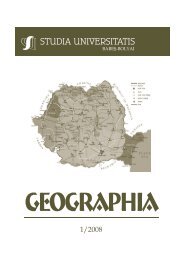musica - Studia
musica - Studia
musica - Studia
Create successful ePaper yourself
Turn your PDF publications into a flip-book with our unique Google optimized e-Paper software.
FROM THE METAPHOR OF WATER TO CORRESPONDENCES BETWEEN ENESCU, EMINESCU …<br />
to be concerned not only with music, but with everything that belongs to the<br />
history of battles fought by humanity. Only through this focus, will you be able to<br />
plant humane values and humanity in your spirit and start from here in your<br />
artistic expression. /…/ since without faith and humanity, art cannot be born.” 100<br />
Let us add that the ancient mermaids that appear in the end are<br />
considered funereal deities in Greek mythology, helpers in the process of dying,<br />
whose cult was connected to Persephone, the wife of Hades, herself associated<br />
not only with death, but also with the regenerating force of nature, vitality<br />
and rebirth 101 .<br />
Moreover, I think it’s important that in Vox maris the emphasis isn’t<br />
placed on the human element 102 , but on the natural one (water): the title is<br />
neither The Sea (like at Debussy), nor The Sailor and the Sea, but The Voice of<br />
the Sea, the aquatic element being personified 103 ; the proportion of characters is<br />
reduced, by placing them in the backstage or by cutting short their interventions.<br />
Hence, Enescu sees things from a double perspective: the individual one, in<br />
which case personal option is vital and who, by fulfilling his duty and thus<br />
keeping his human dignity, answers the call of the sea; the trans-historical one,<br />
in which the impact of the tragedy, of the hero’s sacrifice is modestly restrained<br />
to the dimension that any passing historical event should have, while being<br />
engulfed by eternity and Absolute (in support of this idea are, to a certain extent,<br />
the architectures of the two works 104 ). A similar vision to that expressed in a late<br />
confession 105 , when the composer repeats the metaphor of the terrestrial-cosmic<br />
reflection or if you’d like, life-work: “Upon reaching the shore, I look behind me at<br />
the ocean of life: the waves that get lost in the distance and everything that is left<br />
is a clear mirror that reflects the sky – my sky: music”.<br />
100 George Enescu, in: Uj Kelet, Cluj, 20, no. 265, 21 st of November 1937, p. 8. Translation from<br />
Hungarian: Theodor Sugar. Text reproduced in: George Enescu – Interviuri II (George Enescu<br />
– Interviews II), p. 66-67.<br />
101 Kernbach, V. op. cit., p. 545-546.<br />
102 As the scenario formulated in: Amintiri (Souvenirs) would sound, p. 100-101.<br />
103 Which once again leads us to the connections with traditional spirituality.<br />
104 In The Fifth Symphony, the ending “from the entry of voices to the final measure, there is only<br />
a re-telling, a recount of those depicted in the first movement of the symphony. Through this,<br />
the score captures /…/ a certain transcendence and conceptual unity” (Bentoiu, Pascal,<br />
Capodopere enesciene / Masterworks of George Enescu, Editura Muzicală, Bucureşti, 1999, p.<br />
591). Somewhat similar, the sixth section of Vox maris (75/2) repeats the material of the first<br />
section, followed by “echoes of the catastrophe” (see: Bentoiu, Pascal, Capodopere enesciene<br />
/ Masterworks of George Enescu, Editura Muzicală, Bucureşti, 1999, p. 351.).<br />
105 George Enescu, in: Gavoty, Bernard, op. cit., p. 112.<br />
99


